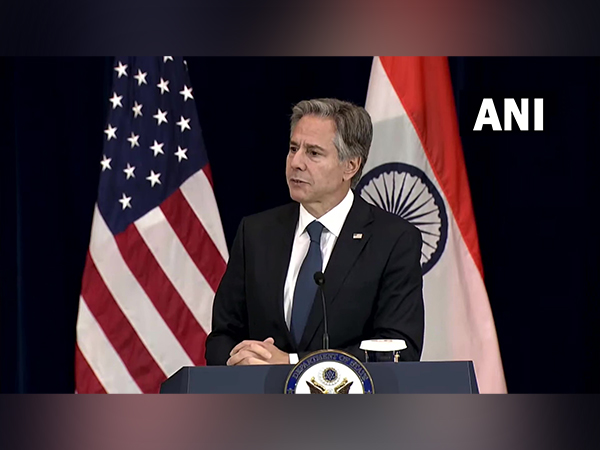
Islamabad [Pakistan], September 27 (ANI): While Pakistan at UNGA recently urged the international communities to help it with economic losses amid the unprecedented flooding, which is estimated to be USD 28 billion, on the other hand, it recently received F-16-related equipment from the United States worth USD 450 million. The recent flooding in Pakistan which created havoc in the country is estimated to cause damage to the extent of USD 28 billion and an upsurge in poverty by 5 per cent, indicating that nine to 12 million people might fall below the poverty line, The News International reported.
Pakistan has a total of 160 districts. To date, half of these across the country is declared “calamity hit.” But the Balochistan and Sindh provinces were majorly hit during this unprecedented flooding. Sindh has suffered the most and its damages stand at a whopping sum of USD 5.9 billion. Balochistan is second with USD 3.04 billion in losses.
The losses in Punjab stand at USD 0.55 billion, Khyber Pakhtunkhwa at USD 0.54 billion, while Pakistan-occupied Kashmir and Gilgit Baltistan suffered a loss of USD 0.02 billion and USD 0.03 billion respectively, the officials noted. Despite this, Pakistan received F-16-related equipment for an estimated cost of USD 450 million from the US while its own people remain in dire need of food and medical assistance.
The locals of the Sindh and Balochistan province claim that no officials have visited the flood-affected area to ascertain the magnitude of the disaster leaving the people to suffer. There is also an outbreak of diseases in the two provinces, children are dying from cholera.
The stagnant floodwaters have led to widespread cases of skin and eye infections, diarrhea, malaria, typhoid and dengue fever across numerous provinces, triggering health threats to people. Despite the efforts of the government and local and foreign relief organizations, many people are in urgent need of food and medicine in flood-hit regions.
On Monday, a consultative meeting was held with renowned economists of the country, with the Planning Commission’s chief economist. To estimate the economic losses, a Post Disaster Needs Assessment (PDNA) was conducted which indicated that the GDP of the country for the fiscal year of 2023, is expected to be at 1.8-2.3 per cent compared to the annual plan target of 5 per cent.
The officials estimated that 1.8 to two million jobs were lost in this flood and average inflation might touch the 23 to 25 per cent mark in the current fiscal, The News International reported. The agriculture growth might plunge into negative by -0.7 to -2.1 per cent compared to the envisaged target of positive 3.9 per cent for the current fiscal. Export losses might face a burnt of USD 3 billion. “The loss in the agriculture sector is expected to be 3.5-4.5 per cent; agriculture growth may remain negative (0.7 to 2.1%) compared to the target of 3.9 per cent. The loss in the growth of the industrial sector will be 3.5-4 per cent due to its backward linkages with the agriculture sector,” the officials said.
The lower availability of domestic cotton and high global prices, growth in the textile sector is expected to drop. Due to lower demand, automobiles and fertilizer sectors are also expected to be affected, The News International reported. Overall export losses are anticipated to be around USD 3 billion during FY23 due to a decline in global demand and lower exports of rice, cotton, fruits and vegetables. Import of raw cotton, wheat, and vegetables is expected to increase due to flood losses. Water availability is expected to improve the energy mix, resulting in lower oil imports.
Moreover, Pakistan Railways suffered the most with USD 2.4 billion losses, the Ministry of Housing and Works USD 0.02 billion, the National Highway Authority and Pakistan Post Office USD 0.2 billion and the Ministry of Water Resource faced losses of USD 0.29 billion, The News International reported.
Industrial growth for FY 2023 is expected to be 1.9-2.5 per cent compared to the target of 5.9 per cent. In the services sector, wholesale and retail trade services will be adversely affected and growth will remain at 3 per cent compared to the target of 6.5 per cent.
Transport and storage services are expected to grow by 3 per cent compared to the target of 4.5 per cent due to damage to crops, livestock, roads and rail networks. Hoteling, tourism and education services are also expected to suffer. Services growth for FY 2023 is now expected to be 3-3.5 per cent compared to the original target of 5.1 per cent. Due to supply chain disruptions and shortage of perishable items, inflationary pressures are expected to further aggravate.
Additionally, lower GDP growth and income level will lead to lower aggregate demand, causing a reduction in the overall import bill. GDP growth for FY23 is expected to be at 1.8-2.3 per cent compared to the annual plan target of 5 per cent, an income loss of Rs 2.4 trillion, The News International reported.
Earlier, this month it was reported that unprecedented floods caused economic loss neared around USD 18 billion, an increase from USD 12.5 billion estimated last month. In the wake of the increased economic losses, the Pakistan government has made plans for reconstruction but it might take two to 10 years for long-term construction of the flood-affected areas, the officials said.
The country this year faced one of the worst flooding events in its history. Millions across the country have been affected by the rains, floods and impacts such as landslides, destroying infrastructure, homes, agricultural land and livestock.
According to government estimates, about 33 million people across the country have been affected by unrelenting heavy rains and flooding – the worst in decades. Millions of acres of crops and orchards – many of those ready to harvest – have been damaged and destroyed, and the next planting season is threatened. Agriculture is a critical source of sustenance and livelihood for the majority of families in Pakistan, and for the economy of the country.
Besides, 103 dams have also been damaged due to heavy rainfall and flooding in the province while crops on over 900,000 acres of land were also damaged. 2,198 km of roads and 22 bridges have also been damaged amid the calamity. On September 5, Dr Ahmed Al-Mandhari, WHO Regional Director for the Eastern Mediterranean, had said that the current scale of damage and destruction due to the floods is like none seen before in Pakistan – a result of long-term global climate change leading to more severe weather conditions. (ANI)
This is a sustainment program for F-16s that Pakistan has long had: Blinken

Washington [US], September 28 (ANI): US Secretary of State Antony Blinken highlighted several issues including the ongoing Ukraine conflict, the Indo-Pacific situation, during a joint press conference with External Affairs Minister S Jaishankar on Tuesday.
Speaking over the Pakistan F-16 row, the US official said: “This is a sustainment program for F-16s that Pakistan has long had. These are not new planes, new systems or new weapons. It is sustaining what they have. We have a responsibility and an obligation to whomever we provide military equipment to…to make sure that its maintained. Pakistan’s program bolsters its capability to deal with terrorist threats,” Blinken said in response to a query.
Earlier has raised questions over the “merits” of the US-Pakistan relationship and said that Washington’s ties with Islamabad have not served the “American interest”. “It’s a relationship that has neither ended up serving Pakistan well nor serving the American interests,” Jaishankar said at an event organized by the Indian American community in Washington on Sunday.
Earlier today, Jaishankar discussed new opportunities for bilateral defense industrial cooperation with US Defence Secretary Lloyd Austin. Defence Minister Rajnath Singh promptly had conveyed to US Defence Secretary Lloyd Austin India’s concerns over Washington’s decision to provide a sustenance package for Pakistan’s F-16 fleet. “It’s really for the United States today to reflect on the merits of this relationship and what they get by it,” Jaishankar asserted.
Speaking over India Pakistan relation, Blinken said that US “always encourage our friends to resolve difference through dialogue” Both leaders highlighted the Indo-US ties, with the US official adding that the partnership between the two democracies was “one of the most consequential in the world”.
In his remarks, Antony Blinken referred to remarks made by Prime Minister Narendra Modi during his meeting with Russian President Vladimir Putin on the sidelines of the SCO summit. “I really want to emphasize on what PM Modi said, I think he captured, as well as anyone I have heard, fundamentally what this moment is about as he said, this is not an era, the time for war and we could not agree more,” he said.
PM Modi, in his remarks during the meeting with Putin, had noted that India and Russia have stayed together for several decades. (ANI)



















